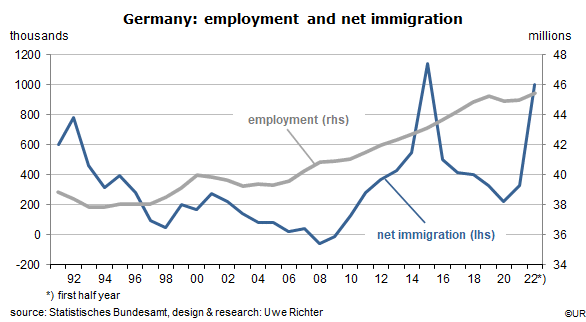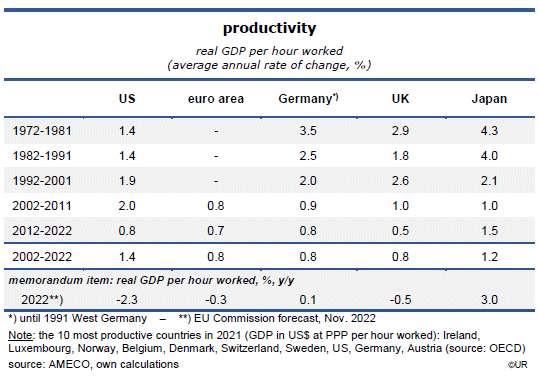Dieter Wermuth, Economist and Partner at Wermuth Asset Management
For years we have been told that not only the German, but the European population as well are aging quickly and will soon, on present trends, lose their global relevance. A country and a continent are retiring and getting rid of themselves. There are bestsellers on this topic, and a cottage industry which focuses on the fact that the baby boomers will soon leave the labour force, and their professional skills will then be lost for good. Moreover, there is, and will be, a lack of apprentices, butchers, care workers, heating installers, IT people and, more generally, skilled workers.
As an economist I continue to be puzzled by such predictions. Aren’t we living in a market economy? And isn’t one of its key features the ability to respond speedily and efficiently to shortages of any kind, as long as the incentives are right and money can be made? Our system cannot really convince people to have more children. That much is clear, but aren’t we also told that the earth is overpopulated? Just these days we have learned that there are now 8 billion people on this planet – up from 1.9 billion a century ago.
There are lots of people who would love to come here and work. It cannot be so difficult to organize immigration and match demand and supply on labour markets: just avoid that they all come from the same corner of the world, and invite only those who do not insist that sharia is above our law. The principle of diversification must also apply to immigration. Why does the German administration insist that it is only looking for skilled workers from abroad, with the appropriate professional documents. No, Europe needs just workers, skilled or not. To focus on the highly qualified is actually unfair, as it reduces the average professional standard in the countries where people come from and is clearly in contradiction to rich countries’ development policies.

Despite all those Cassandras and the reluctance to let foreigners in, overall employment has increased briskly in recent years. At least in Germany, where the number of jobs has reached 45.5 million, after 40 million at the turn of the century. The main reasons have been the steeply rising participation rate of women and the immigration of refugees. In general, the integration of foreigners has been a success, xenophobic crimes have been few and far between, and the extreme right party AfD has been losing seats at the recent national elections.
And public opinion has begun to change. According to the new consensus of politics, science and media, the desirable annual net immigration is now in the order of 400,000 – this would keep total employment stable at its 45.5 million level and facilitate the financing of social security, including pensions. Since it is less than 0.5% of total population, the economic challenge is manageable, not least because hardly any immigrant arrives here intent on leading a lazy life in what is called the country’s social hammock. This is just populist propaganda, and not borne out by the numbers. Most immigrants are young and want to succeed in their jobs.
Those who are still opposed to the presence of so many foreigners and their offspring must do something about productivity growth if they want to earn good money now and have a comfortable retirement later. Decade after decade, productivity growth has slowed in Europe, but also in the US, in China and Japan – in OECD countries it is approaching zero. Note that there is not a significant difference between countries in this regard any longer. Even the UK, with its supposedly catastrophic management of the national economy, is not doing worse than Germany, or the euro area as a whole.

What can be done to stop the trend? The main policy instrument is education, the permanent upgrading of professional skills, good schools, the promotion of competition domestically and across borders, backed up by a robust social system and fair taxes. Microeconomic studies continue to show that lower taxes are not the instrument of choice to boost the growth rate of hourly productivity.
According to studies by MIT and Harvard economists as well as the OECD the most effective growth policies are a more egalitarian distribution of income and wealth and a strategy to promote professional opportunities for all. Just two pieces of evidence to support that point: 1. during the so-called trente glorieuses, the 30 years after the War, and before the victory of neo-liberalism in economic policy making, rapid productivity growth happened simultaneously in all Western societies, managed by interventionist governments with a Keynesian and egalitarian bend; 2. today, of the top ten OECD countries in terms of productivity levels, nine are in central and northwestern Europe – the other one is the US; the Europeans all look back on a long tradition of activist social policies. Financial security, guaranteed by the state, seem to boost, not to slow productivity growth. The nanny state is just making a comeback. Who would have expected such a turnaround in economic policy making?
###
For more information please contact:
Instinctif Partners
Lars Hofer
E lars.hofer@instinctif.com
T +49 162 562 8917
Visit us: https://wermutham.com/
Follow us on Twitter and LinkedIn
About Wermuth Asset Management
Wermuth Asset Management (WAM) is a Family Office which also acts as a BAFIN-regulated investment consultant.
The company specializes in climate impact investments across all asset classes, with a focus on EU “exponential organizations” as defined by Singularity University, i.e., companies which solve a major problem of humanity profitably and can grow exponentially. Through private equity, listed assets, infrastructure and real assets, the company invests through its own funds and third-party funds. WAM adheres to the UN Principles of Responsible Investing (UNPRI) and UN Compact and is a member of the Institutional Investor Group on Climate Change (IIGCC), the Global Impact Investing Network (GIIN) and the Divest-Invest Movement.
Jochen Wermuth founded WAM in 1999. He is a German climate impact investor who served on the steering committee of “Europeans for Divest Invest”. As of June 2017, he is also a member of the investment strategy committee for the EUR 24 billion German Sovereign Wealth Fund (KENFO).
Legal Disclaimer
The information contained in this document is for informational purposes only and does not constitute investment advice. The opinions and valuations contained in this document are subject to change and reflect the viewpoint of Wermuth Asset Management in the current economic environment. No liability is assumed for the accuracy and completeness of the information. Past performance is not a reliable indication of current or future developments. The financial instruments mentioned are for illustrative purposes only and should not be construed as a direct offer or investment recommendation or advice. The securities listed have been selected from the universe of securities covered by the portfolio managers to assist the reader in better understanding the issues presented and do not necessarily form part of any portfolio or constitute recommendations by the portfolio managers. There is no guarantee that forecasts will occur.
Read the full article in PDF format here: English.
